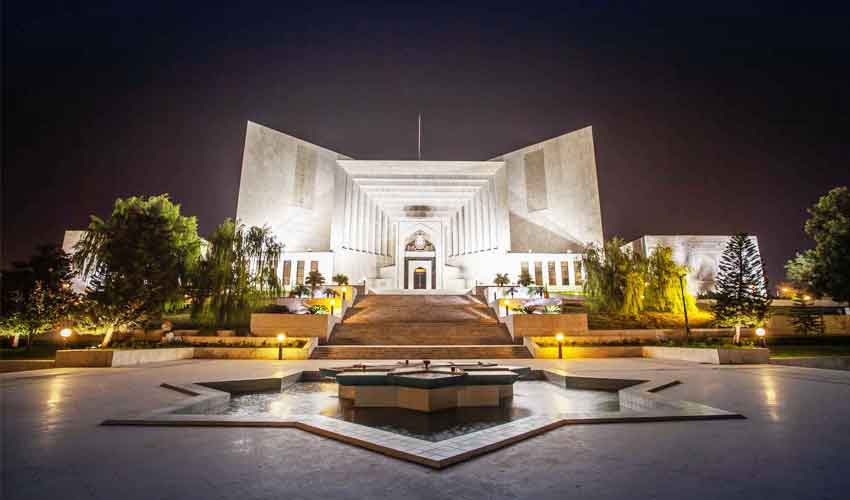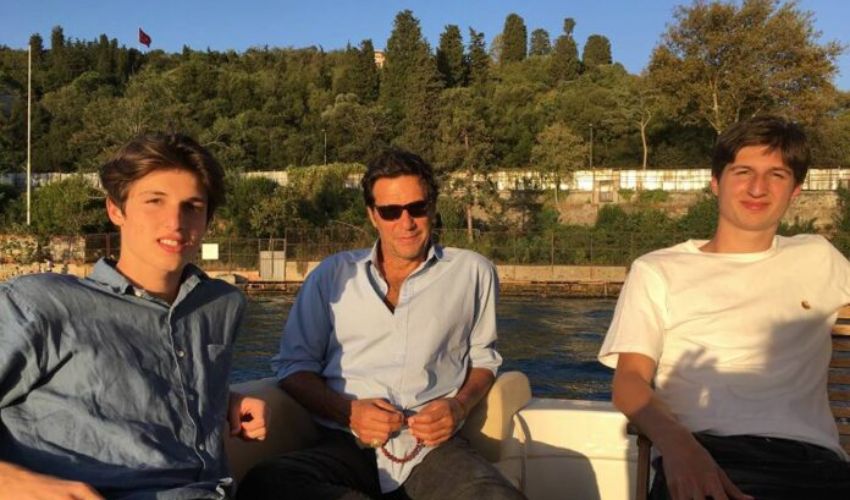Chief Justice of Pakistan Qazi Faez Isa questioned during the hearing on the Election Commission of Pakistan's (ECP) appeal against the formation of election tribunals: How can a presidential ordinance be introduced in the presence of law of parliament?
The election tribunals ordinance falls under the category of interference in elections. The Supreme Court later rejected the request of the election commission to suspend the decision of the Lahore High Court, while also accepting the request of nine PTI candidates to become a party in the case.
CJP Isa and Justice Naeem Akhtar Afghan heard the election commission's appeal against the formation of election tribunals. ECP lawyer Sikandar Bashir and PTI counsel Salman Akram Raja appeared before the court.
The election commission lawyer told the court that the case was about the interpretation of Article 219(c) of the Constitution. On being asked by the CJP about the facts of the case, the lawyer said that on February 14, the election commission wrote letters to all the high courts for the formation of tribunals, which was the ECP's authority. Lists of names of judges were requested from all the high courts through the letters, he added.
Sikandar Bashir further said that the LHC submitted names of two judges on February 20, both of whom were notified for election tribunals. Later on April 26, two more judges were notified for election tribunals.
The CJP asked if the chief election commissioner and the chief justice could not meet each other and if everything had to be controversial in Pakistan. There was a dispute between the president and the election commission on the date of the elections.
"Why are letters being written by the registrar of the high court? If the chief justice and the election commissioner had sat down, they could have come up with a solution to the problem. They would have reached a conclusion if they sat down and talked," he remarked.
During the hearing, the CJP made important remarks on the issuance of the presidential ordinances, saying that if ordinances have to be brought in then shut down parliament. The election commission counsel said the Constitution allows for the promulgation of ordinances. He further said he was merely speaking generally, adding that he was not defending ordinances.
CJP Isa asked Salman Akram Raja if he did not challenge the ordinance. On which the lawyer said the ordinance had been challenged in Lahore and Islamabad high courts.
The chief justice remarked that the ordinance also fell under the category of interference in elections and asked were the election commission stood on the issue. The ECP lawyer said it was unnecessary to promulgate the ordinance.
The CJP further remarked that the Constitution was very clear that the election tribunals were the privilege of the election commission, adding that "we have taken an oath under the Constitution and the law, not on court decisions". Whenever the Supreme Court interprets constitutional provisions, complications arise, he added.
The court inquired when the law of retired judges was made and how it could be changed through a presidential ordinance. "On the one hand, parliament has made a law, so how can an ordinance be brought after the law of parliament? What was the reason for bringing the ordinance? Was it an emergency? The Election Act was the will of parliament. Who wanted this ordinance?"
The ECP lawyer said the ordinance was the desire of the cabinet and the prime minister.
The chief justice remarked that the high court decision has been negated through the said ordinance. "Parliament makes the law, we protect the law. Let them do their job, whoever is meant to do it. The ordinance has not been challenged in the Supreme Court, so we cannot take notice," he remarked.
Plea to suspend LHC decision rejected
The Supreme Court later rejected the request of the election commission to suspend the decision of the Lahore High Court, while it also accepted the request of nine PTI candidates to become party in the case.
The court sent the matter to the three-member Practice and Procedure Committee for the formation of a larger bench, and sought the records of the correspondence with other high courts from the election commission. It also issued a notice to the attorney general for Pakistan.
The CJP remarked that two judges included in the Practice and Procedure Committee are currently in Karachi, Lahore Registry, therefore, the committee meeting will be held next week.
During the hearing, the ECP lawyer requested that a stay order be issued on the decision of the LHC single-member bench, pleading that they could then hold meaningful dialogue with the LHC chief justice. The CJP said Salman Akaram Raja was opposing the stay order, adding that they could not stop the election commission and chief justice of the Lahore High Court from holding talks. He further said that possibly on Monday, the LHC CJ will take oath as a judge of the Supreme Court.
Background of the case
On June 14, the Supreme Court had scheduled the ECP's application for hearing against the decision of the Lahore High Court to form election tribunals. The commission had filed an appeal against the decision of Justice Shahid Karim of the Lahore High Court.
The position adopted in the application was that the constitution of election tribunals was the authority of the election commission, and the LHC's decision to constitute tribunals was against the law and the high court could not use the powers of the commission.
The ECP requested the Supreme Court to annul the decision of the Lahore High Court and set the appeal for hearing. It should be noted that Chief Justice Shahzad Malik issued orders for the formation of eight tribunals on June 12 based on the decision of the Lahore High Court.



























